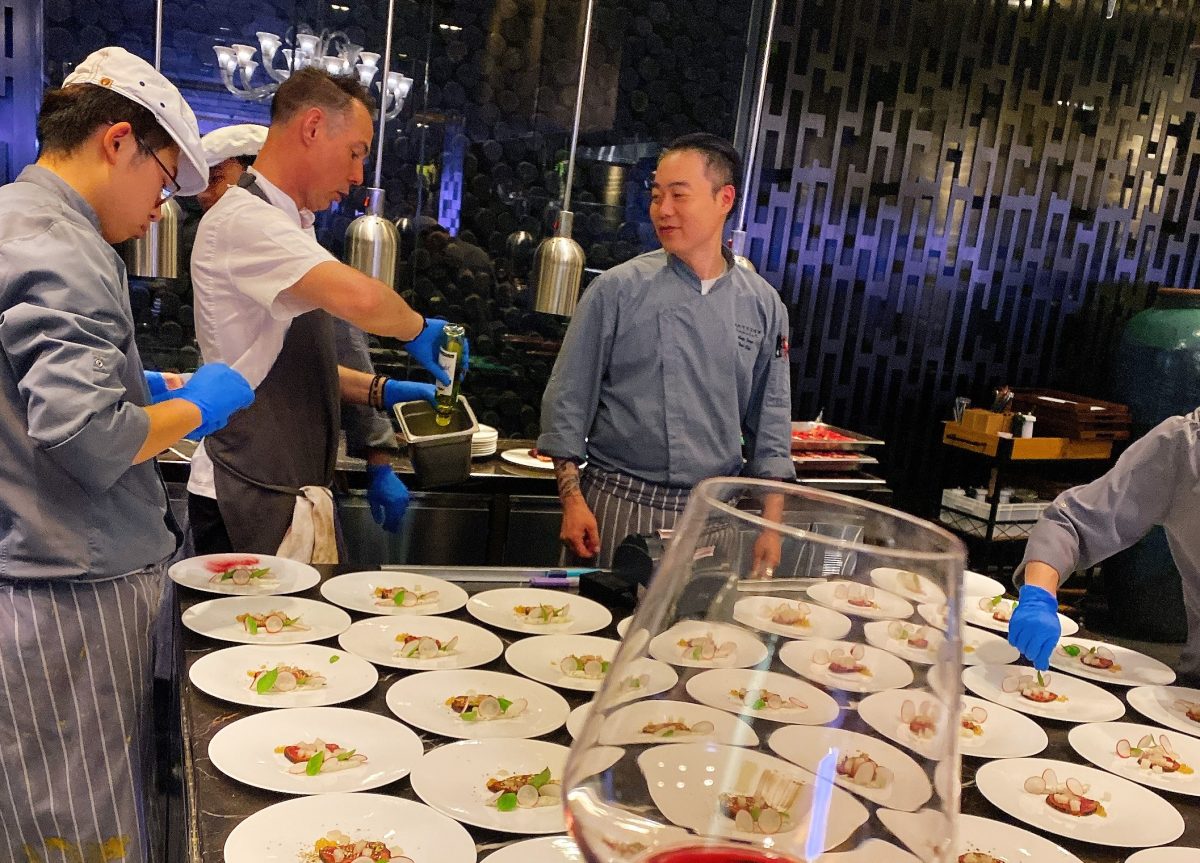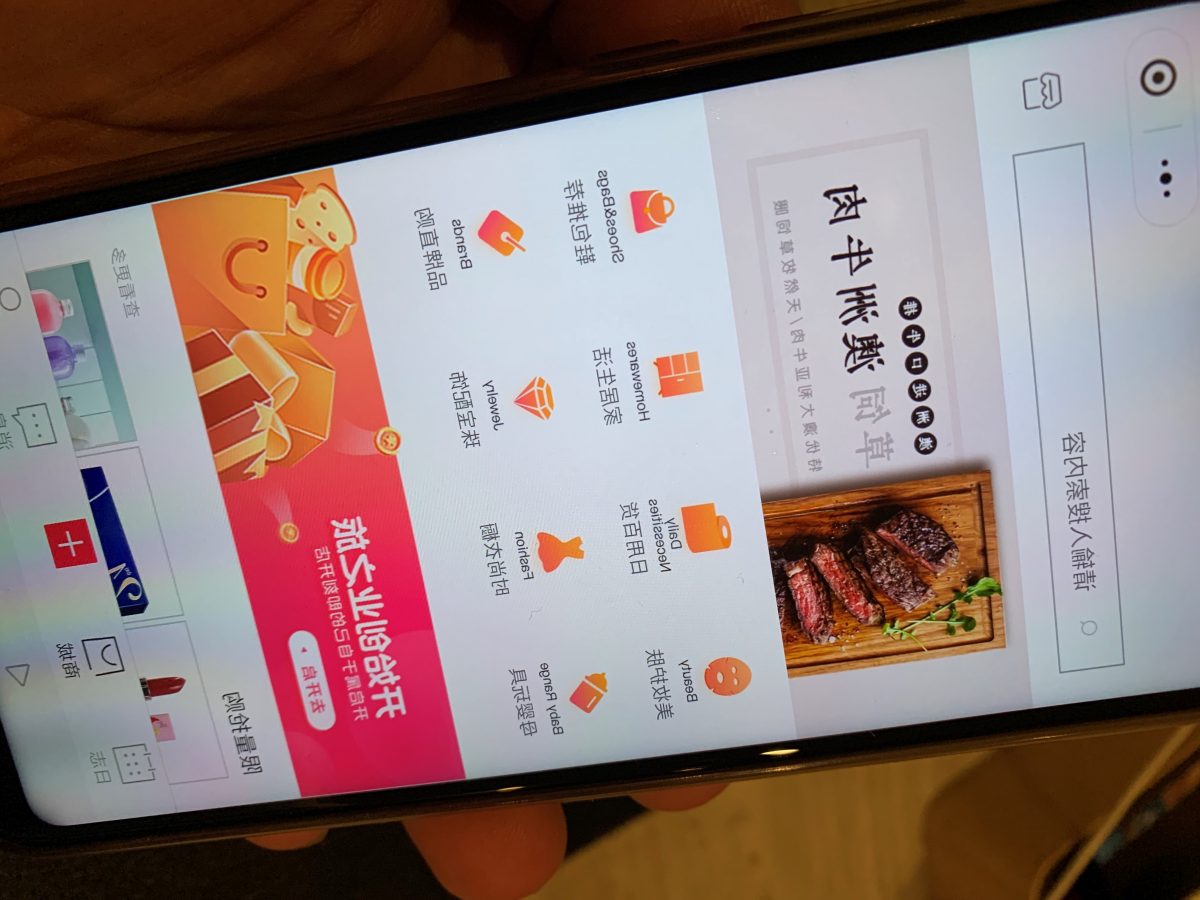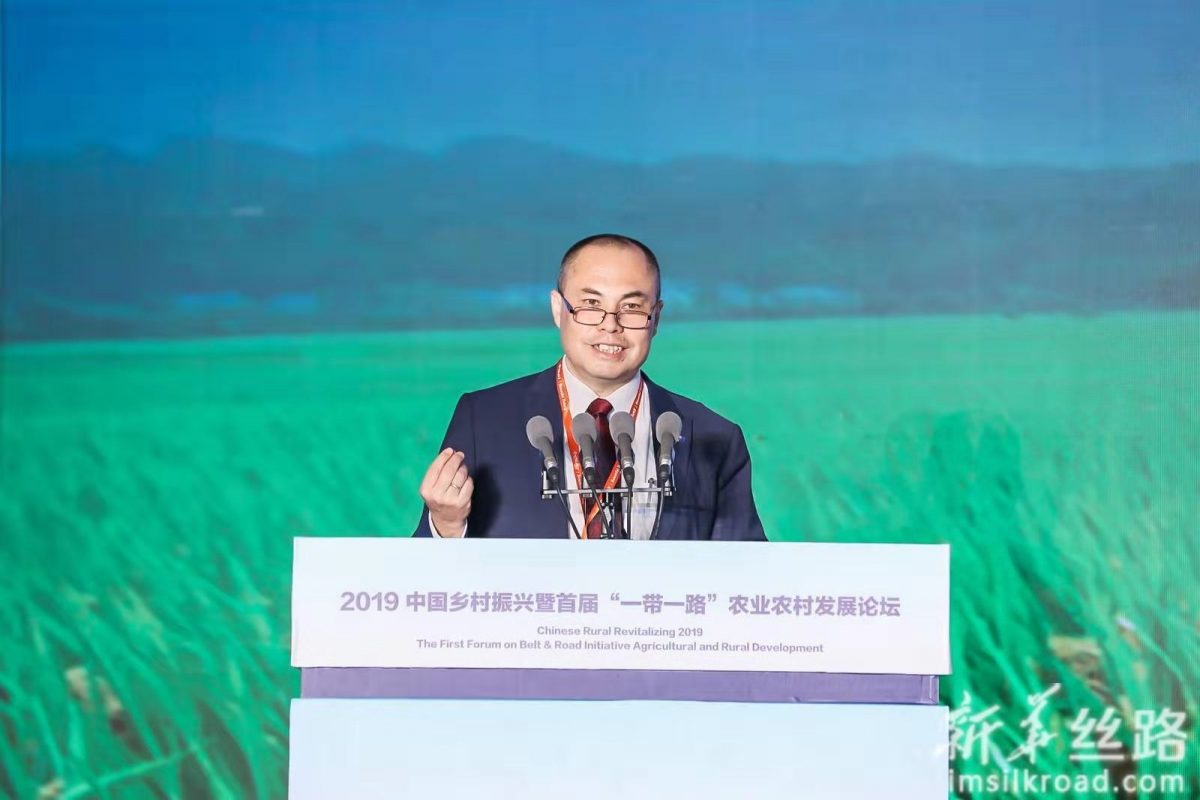BeefLedger and an interdisciplinary research team at QUT will work with food-buying groups across Australia and China to explore blockchain-based approaches to streamlining cross-border trade, in the initial proof-of-concept stage of a multi-stage Future Food Systems project that will develop the soft and hard digital infrastructure needed to support the growth of smart trade. The new infrastructure will complement the physical elements of regional export hubs and cultivate new approaches to digital value creation in light of current trends in consumer culture and communities.
“COVID-19 is challenging the ways countries interact with each other,” says QUT Adjunct Professor Warwick Powell, Founding Chairman of Brisbane-based BeefLedger Ltd. “No more so is this true than in trade.
“As we all reflect on the strategic implications, the country’s largest trading partner [China] is emerging from the pandemic shutdown.
“Getting our blockchain house in order, especially in the food exports space, is in Australia’s national interest.”
Enter the Blockchain and Smart Trade project, a multi-stage collaboration between BeefLedger, SCP Capital Pty Ltd and the QUT research team aimed at developing new digital infrastructure to make cross-border trade safer and more streamlined post-pandemic.
The new project series with the Future Food Systems CRC builds on a foundation of groundbreaking research and development work collaboratively undertaken and co-funded by QUT, BeefLedger Ltd and the Food Agility CRC on the Export Smart Contracts project.
The Export Smart Contracts research work focused on a blockchain-enabled cross-border financial transactions smart contracts tool. It has provided considerable learnings in the beef supply chain space. The BeefLedger team acknowledges the contributions of Food Agility in this proof of concept development and looks forward to ongoing collaborative opportunities across the CRC community.
Now, drawing on BeefLedger’s expertise in blockchain for beef supply chains and extensive networks in China, the Future Food Systems project will design and develop a new, smart platform for cross-border trade of food commodities to regions across the globe, with China the key counterpart and case study for the initial proof of concept.

Warwick Powell, founding Chairman of BeefLedger and an Adjunct Professor at Queensland University of Technology (QUT), is the Industry Lead on the three-year, multi-stage Blockchain for Smart Trade project that aims to develop new hard and soft digital infrastructure for cross-border trade. Credit: BeefLedger
What is the Blockchain and Smart Trade project?
The project, the long title of which is ‘New approaches to blockchain, governance and digital communities for Smart Trade Hubs: a modularised and scaleable multi-stage program of research’, aims to develop the soft and hard digital infrastructure required to support the growth of smart trade in a post-pandemic cross-border trading context, with the China market the principal counterparty.
As the first project in the CRC’s smart trade hub research stream, it will explore the role of distributed ledger technology in streamlining the supply chain for food exports. CRC CEO David Eyre says the project will make an important contribution to the CRC’s trade and logistics innovation road map.
“Our aim is to develop and demonstrate technology and business solutions that strip time and cost from the supply chain, and at the same time increase transparency and safety for consumers,” Eyre says.
“Trading partners, particularly in key North Asian markets, are moving to digitise ordering, fulfilment and trade documentation and compliance processes. It is essential that Australia builds capacity to implement end-to-end digital systems that are seamlessly interoperable with those in key markets.
“Blockchain is a key enabling technology in this regard.”
The research for the project will be conducted by a team of QUT researchers led by Professor of Urban Informatics and Chief Investigator Marcus Foth with Dr Felicity Deane from the Faculty of Law and the Faculty of Science and Engineering’s Associate Professor Xavier Boyen. Adj. Prof. Warwick Powell is the project’s industry lead.
“I am very excited to lead the project and continue the collaboration with BeefLedger Ltd,” says Professor Foth.
“All too often, we see food supply chain projects that are too narrowly focused on either just the physical and agricultural aspects or the digital technology aspects. The Smart Trade Hubs project at QUT is truly transdisciplinary in that it brings together technical expertise in blockchain and smart contract development; legal expertise in international trade and governance; and humanities expertise in food provenance and consumer culture.
“The project is hosted by the QUT Design Lab, so it is design-led, which enables innovation through lateral thinking and a modularised and scaleable program of research.”
“The Blockchain and Smart Trade project will benefit not just our food supply chain partners and the Australian food export industry but will also support economic development in new ways across regional Australia.”

Professor of Urban Informatics at QUT, Marcus Foth, will lead the research team. Credit: Queensland University of Technology
Secure, streamlined digital infrastructure for smart trade
The Blockchain and Smart Trade project will run for three years from May 2020 and has four stages:
In the first stage, Proof of concept, scheduled for completion by 30 April 2021, the project team will design the foundational technology, with the focus on integrating blockchain asset registration and tracking on the supply side with consumer aggregation pull on the demand side.
The aim is to develop new hard and soft digital infrastructure to overlay and complement the physical elements of export hubs: transport infrastructure; storage; logistics and the like – that has blockchain technology (distributed ledger technologies, or DLT) at its core, is buttressed by off-chain governance systems, and takes ‘new approaches to digital value creation’ in the light of contemporary trends in consumer culture and communities.
In stage two, PoC deployment in the NSW beef supply chain, the team will then apply the new technology in the red meat supply chain at increased levels of granularity and sophistication, enabling them to evaluate the implementation of demand aggregation-enabled models of supply-side planning, risk mitigation and financing. It is expected that as data volumes and activity grow, the capacity of AI and machine-learning capabilities to add to network optimisation will increase.
The third stage of the project, Cross-border governance, is aimed at achieving ‘streamlined cross-border flow,’ backed by cross-border governance regimes that support whole-of-chain data verification and acceptance, to enable ‘paperless’ customs processing and movement.
In the final stage, Multi-sector scaling, the team will be able to draw on its work over Projects 1-3 to extrapolate the core technical foundations, relationships and business models that support scaled market entry for other food exports into the various China markets.
“The project builds on our learnings and experience in developing beef supply chain-specific blockchain-based cross-border technological platforms focused on the China market,” explains Adj. Prof. Powell.
“The aim of this new, collaborative project is to expand from beef to develop the tools by which food exporters generally can seamlessly access the China market, utilising technologies that are at the leading edge of supply chain traceability, product authentication and streamlined cross-border payments.”

Australian beef and wine showcase dinner, Beijing (November 2019). Partnered with social e-commerce platform Liberty Post, with more than 70 guests including leading hotel chefs, wine sector wholesalers and provedores, hotel managers and social e-commerce referral leaders. Credit: BeefLedger
Alignment with other CRC partners
David Eyre said that cross-fertilisation and collaboration is a central benefit of the CRC model.
“Many Future Food Systems CRC partners are stakeholders in the smart supply chain space. To this end, BeefLedger, NSW Farmers, Escavox and NSW DPI are discussing a related demonstration project that involves traceable export of goods at test market scale,” Eyre explains.
“New business and policy models are just as important as the technology. Industry and government supply chain actors need to gain experience in working with the new technologies so they can explore the real-world challenges and opportunities.
“This is also an area in which we intersect with several other CRCs,” he notes. “In addition to working with our government and industry partners, we anticipate future collaboration in this domain with the iMOVE CRC, CRC for Northern Australia, Fight Food Waste and Food Agility CRCs.”
Alignment to The National Blockchain Roadmap and CRC milestones
The project aligns with some key priority areas laid out in the federal government’s The National Blockchain Roadmap (February 2020):
- agricultural provenance and mitigation against brand value degradation due to counterfeiting and food fraud;
- cross-border trade, with the focus on working with relevant government departments to ensure Australian businesses can connect into emerging digital trade infrastructure; and
- opportunities to leverage bilateral agreements to consider pilot projects and collaborations incorporating blockchain technology.
It is also of great relevance as Australia prepares for a post-pandemic world in which ensuring product safety and end-to-end traceability will be even more critical.
“This is crucial timing as we begin to build the post-COVID-19 ‘new normal’,” Adj. Prof. Powell concurs.
“The project is 100 per cent aligned with the Commonwealth Government’s emphasis on food supply chain use cases in The National Blockchain Roadmap (February 2020), and can showcase the best in Australian creativity and applied innovation.”

Social e-commerce WeChat mini-app Liberty Post has around 300,000 regular active users and growing – an audience reach of tens of millions via an extensive network of online influencers and in-house ‘key online consumers’, with more than 120,000 SKUs listed. Social e-commerce, integrating e-commerce with social referrals and digitalised gamification is the fastest growing retail channel in the China market. Credit: BeefLedger
China’s ‘emerging new normal’
Currently, China is Australia’s largest trading partner, and this situation will likely continue well into the future. Various key developments in China are shaping ‘the emerging new normal’ – China’s domestic economic patterns and drivers, including concerns, some of which have been magnified as a result of the recent COVID-19 outbreak, and how these will impact its trading partners post-pandemic.
Elements of the emerging new normal include:
- Increasing household food consumption as China’s population becomes wealthier – and specifically, growing consumption of imported foods (proteins, horticulture, etc.), continuing to drive demand and opportunity for cost-effective producers of excellence. The focus of the Smart Trade Hubs project is on the costs involved in the production, collection, validation, storage and transmission of information, and on optimising information production chains – fundamental to delivering direct efficiencies, and with potential to reduce the costs of mitigating risks of information asymmetry and capriciousness, enhancing forward and backward traceability.
- China’s adoption of the Healthy China 2030 Strategy in 2016 and the launch of its implementation plan in 2019; the Strategy includes commitments to improve China as Australia’s largest agricultural market.
- From 2019, a China-wide commitment to a blockchain-centric pathway, with strategies based on integrating industry, academic research and individual enterprises in ‘blockchain industry associations’, setting the frame for longer-term ‘whole-of-industry’ governance and expected to open new frontiers of innovation; coupled with China’s new laws on cryptography and cybersecurity, with national and international standards relevant to blockchain development.
- An evolving retail landscape in China, with digital technologies at the interface of consumers and product supply chains. Traditional e-commerce platforms are now being augmented by new models based on social e-commerce in which consumers and their ‘trusted networks’ are at the heart of new modes of value creation; ‘gamification’ of group-buying (团购), referrals, and the transformation of consumers from passive buyers to active creators of value via digital production (otherwise known as digital prosumerisation),with implications for sales, referral and distribution models and the capacity for Australian producer communities to integrate meaningfully into these circuits of digital value; and the meshing of digital consumerisation with new ‘experience-based’ shopping.
- Group buying, consolidating through network-based notions of trust formation and opportunities to leverage value from supply chains by mobilising purchasing power. To date, this has emerged primarily from social networks, but a new level of aggregated buying is emerging: community-group buying (社区团购), manifesting in new demands for better supply-chain credentialing and the potential for new forms of buyer-initiated risk mitigation for upstream suppliers.
- Consumer prosumerisation, anchored in social e-commerce, in which consumers are also producers of new content accessed by vast networks – to wit, the emergence of short video services such as Douyin and Kuaishou, that enable huge numbers of people to generate new value flows anchored around their trusted networks.

Social e-commerce WeChat mini-app Liberty Post. Here is BeefLedger’s product featuring on the app homepage. Credit: BeefLedger
A key challenge for exporters is how to best to participate in these dynamics. Doing so will require a concerted commitment to capacity-building, which in turn will drive new opportunities for regional economic development, based on the digital economy aligning with traditional supply chain activities.
“So far, the cross-country trade between Australia and China is geared towards volume, but food produce remains largely undifferentiated and unable to take full advantage of food provenance premium potentials. There is also little cross-cultural understanding between producer communities in Australia and consumer communities in China,” Prof. Foth explains. “Our project will study this in depth.
“We see new social approaches to online retailing emerging in China, and it is crucial for Australia to better understand these new trends in Chinese consumer culture and their impact on cross-border trade.
“Social e-commerce places the consumer and their trusted network at the heart of new modes of value creation. This digital prosumerisation transforms passive buyers of products and services into active creators of value through creative content production on social media platforms such as Douyin (TikTok),” notes Prof. Foth.
“The QUT study will investigate these effects and their implications for sales, referral and distribution models on the one hand, and the capacity for Australian producer communities to integrate meaningfully into these circuits of digital value on the other hand.”

Adjunct Professor Warwick Powell: “Sustaining efficient market access to drive trade growth is central to Australia’s long-run economic wellbeing. That’s why we are excited by this new project, which we are kicking off with colleagues at QUT and collaborators at Future Food Systems CRC.” Credit: BeefLedger
Smart, streamlined trade with China post-pandemic
“Getting trade going again is a key imperative for China, as it is for most of the world’s other economies,” explains Adj. Prof. Powell. “China announced an additional 46 e-commerce trade zones on 8 April.
“The strategic driver now is to streamline the safe movement of goods, services, people and data to drive down costs, minimise delays and get value flowing through the veins of the body economy.”
“This week, China launched its National Blockchain-based Services Network (BSN) and rolled out tests of its Digital Currency Electronic Payments (DCEP) (Digital Yuan) initiative. The BSN is the digital backbone to deliver multiway connectivity to China’s trading partners. It will operate a new internet protocol to enable data-sharing, and more efficient ways to value and exchange digitalised assets. Costs will be inordinately low, removing barriers to on-boarding.”
“Australia exports 70 per cent of its agricultural production,” Adj. Prof. Powell notes. “Of this, 25 per cent is destined for China. Sustaining efficient market access to drive trade growth is central to Australia’s long-run economic wellbeing.”
“That’s why we are excited by this new project, which we are kicking off with colleagues at QUT and collaborators at Future Food Systems CRC.”


